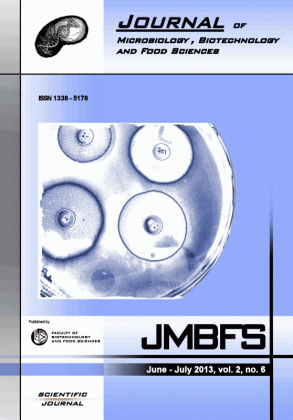DETERIORATION AND SOME OF APPLIED PRESERVATION TECHNIQUES FOR COMMON MUSHROOMS (AGARICUS BISPORUS, FOLLOWED BY LENTINUS EDODES, PLEUROTUS SPP.)
Keywords:
Deterioration, preservation, mushroom, Agaricus bisporusAbstract
Mushrooms are consider as a nutritional and health beneficial product. Three most cultivated mushrooms worldwide are Agaricus bisporus, Lentinus edodes and Pleurotus spp. Mushrooms are highly perishable. They tend to lose quality after harvest, mainly because of their high respiration rate and the fact that they have no barrier to protect them from water loss. Mushrooms’ shelf-life is limited to a few days under normal refrigeration conditions, which is a constraint on the distribution and marketing of fresh product, making extension of mushroom’s shelf life a constant quest. Modified atmosphere packaging provides an affordable packaging system that partly avoids enzymatic browning, fermentation and other biochemical processes by maintaining a controlled gas atmosphere. However, modified atmosphere packaging conditions should be carefully designed. Inappropriate modified atmosphere conditions may be ineffective or even shorten the shelf life of the product due to damage of tissues. Preservation techniques and specially use of MAP, specifically for Agaricus, Lentinus edodes and Pleurotus, is reviewed.Downloads
Download data is not yet available.
Downloads
Published
2013-06-01
How to Cite
Akbarirad, H., Mostafa Kazemeini, S., & Ali Shariaty, M. (2013). DETERIORATION AND SOME OF APPLIED PRESERVATION TECHNIQUES FOR COMMON MUSHROOMS (AGARICUS BISPORUS, FOLLOWED BY LENTINUS EDODES, PLEUROTUS SPP.) . Journal of Microbiology, Biotechnology and Food Sciences, 2(6), 2398–2402. Retrieved from https://office2.jmbfs.org/index.php/JMBFS/article/view/7091
Issue
Section
Food Sciences
License
Copyright (c) 2013 Hamid Akbarirad, Seyed Mostafa Kazemeini, Mohammad Ali Shariaty

This work is licensed under a Creative Commons Attribution 4.0 International License.
All papers published in the Journal of Microbiology, Biotechnology and Food Sciences are published under a CC-BY licence (CC-BY 4.0). Published materials can be shared (copy and redistribute the material in any medium or format) and adapted (remix, transform, and build upon the material for any purpose, even commercially) with specifying the author(s).

